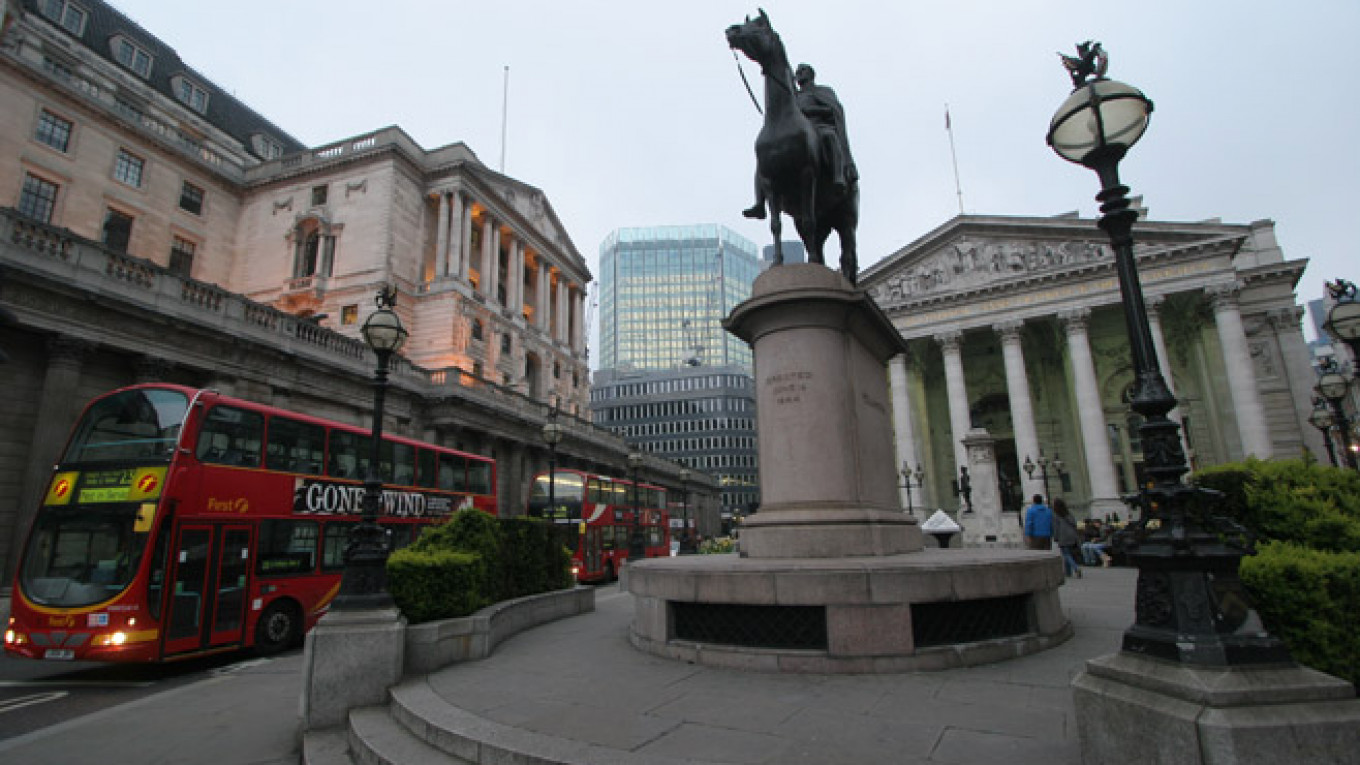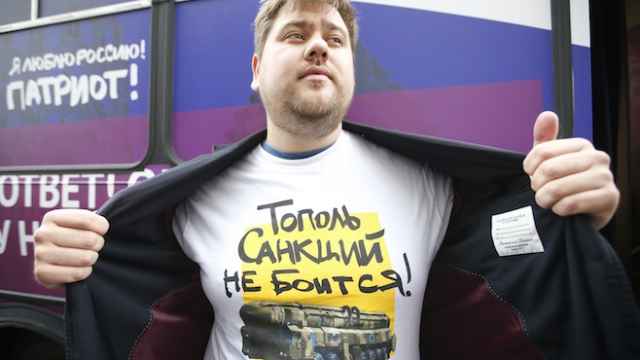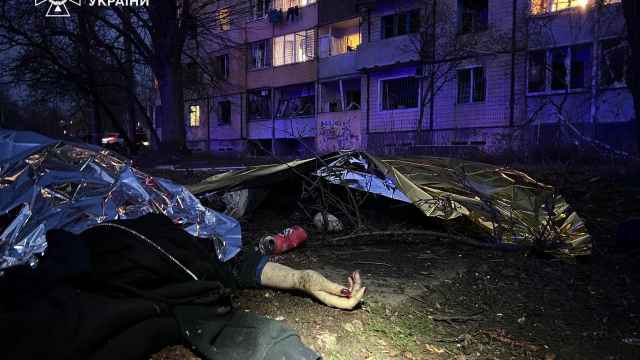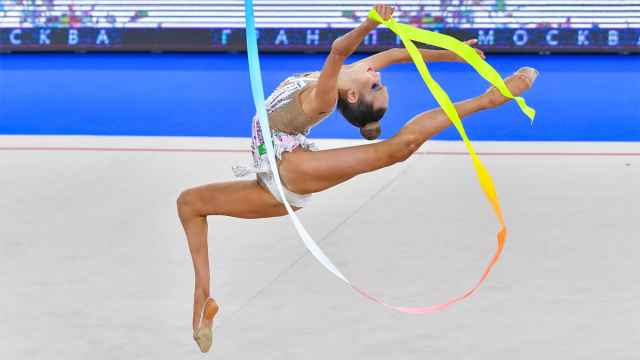Britain has been one of the most aggressive lobbyists for sanctions against Moscow over its actions in Ukraine. But as that crisis has unwound into tit-for-tat trade barriers between Russia and the West, what has happened to London's position as the capital of Russian money abroad?
London has used it arts, culture, shopping and financial clout to attract crowds of Russians and huge volumes of their capital over the past two decades. But now, amid the Ukraine crisis, Russia is foaming with new, anti-Western patriotic fervor.
Hard data on Russian investment in Britain — some of which comes in under the financial radar — is difficult to come by. But leaving aside the banking industry, there are two highly visible areas worth exploring: Russian activity on the London real estate market and the export of British goods to Russia.
Oligarchs' Homes
Russian billionaires — such as Roman Abramovich, Mikhail Fridman and Alisher Usmanov — are famous for buying up expensive pads in London's fashionable districts. But in reality, they are responsible for just a fraction of total Russian spending in the British capital. Russian buyers of London real estate are a mix of the super-rich, the middle class and the upper middle class, said Adam Challis, head of residential real estate at consultancy Jones Lang LaSalle (JLL). The billionaires attract the most attention simply because "they are high-profile and sell newspapers," he said.
According to JLL, Russia's buyer profile is in fact more balanced than China's, for example.
Now, many in these groups perceive Britain as being on the wrong side of the Ukraine conflict. "Buying in London is a more difficult proposition than in the past," Challis said.
But the effect of formal sanctions is difficult to estimate, he added: More influential was a tax on homes owned through companies introduced in 2012. This move "changes the way offshore companies can buy London property, making it a more challenging route," he explained.
In fact, sanctions may even be working in London's favor. Terrified that Russia's business climate can only worsen with the crisis — an impression bolstered by the unexpected arrest of Russian billionaire Vladimir Yevtushenkov last month and the court seizure of his assets — many Russians are moving their capital out of the country. According to state estimates, capital flight will reach $120 billion this year — an amount equal to 6 percent of Russia's gross domestic product.
The Daily Telegraph's international business editor, Ambrose Evans-Pritchard, adds that some rich Russians in London are adversaries of Russian President Vladimir Putin, "so their position would not be affected by sanctions."
In general, the situation is still rife with uncertainty. "Even friends of Putin have property rights, so it is not clear what this all means," Evans-Pritchard said.
Scottish Fish
As fighting in eastern Ukraine between pro-Russian separatists and the Ukrainian armed forces escalated from spring through summer, the EU ramped up its sanctions on individuals close to the Putin regime by blocking trade involving defense equipment and technology for the oil and gas industry. It also shut large state-owned companies out of its capital markets. Russia retaliated by stopping the import of most meat, fish, dairy, fruit and vegetables from countries with sanctions against it.
If another wave of sanctions and counter-sanctions comes, "nobody knows what they could bring," said Trevor Barton, executive director at the Russo-British Chamber of Commerce, which groups hundreds of small- and mid-sized British businesses under its umbrella.
Sanctions have already hit some companies. In particular, "the Scottish smoked fish industry is suffering because their products fall into the category of sanctioned goods," Barton said.
But despite overwrought media reports, sanctions against food products only affect a limited number of businesses and exporters.
Barton's outlook was optimistic: "The biggest British exports tend to be luxury goods such as high-tech equipment, music playing equipment and furniture; clothing [top-end fashion products]; legal and financial services. British-built cars such as the Jaguar Land Rover are very successful in Russia, as is high-tech equipment for the mining industry. JCB [a British heavy equipment manufacturer] is a big exporter to Russia."
Though some industrial exports have been affected, none of these sectors have been shut down by sanctions. And many of the luxury products named by Barton are the sort of British import favored by the Russian middle and upper middle classes, who have a fair degree of disposable income.
One reason for this that when the Soviet Union fell public housing was given away free to residents, meaning less Russians have mortgages, he said.
Companies that were planning on entering the Russian market have been most impacted by sanctions, Barton said."[Sanctions] make them nervous about venturing into the Russian market," he said, and so many of them are revising their plans.
But overall, many businessmen expect the effect will be limited. "There is a lot of business U.K. companies can do," Barton said, adding that business will always transcend the geo-political problems of the moment.
Contact the author at bizreporter@imedia.ru
Correction: An earlier version of this article said industrial equipment exports were unaffected by sanctions. In fact, certain items have been affected.
A Message from The Moscow Times:
Dear readers,
We are facing unprecedented challenges. Russia's Prosecutor General's Office has designated The Moscow Times as an "undesirable" organization, criminalizing our work and putting our staff at risk of prosecution. This follows our earlier unjust labeling as a "foreign agent."
These actions are direct attempts to silence independent journalism in Russia. The authorities claim our work "discredits the decisions of the Russian leadership." We see things differently: we strive to provide accurate, unbiased reporting on Russia.
We, the journalists of The Moscow Times, refuse to be silenced. But to continue our work, we need your help.
Your support, no matter how small, makes a world of difference. If you can, please support us monthly starting from just $2. It's quick to set up, and every contribution makes a significant impact.
By supporting The Moscow Times, you're defending open, independent journalism in the face of repression. Thank you for standing with us.
Remind me later.






